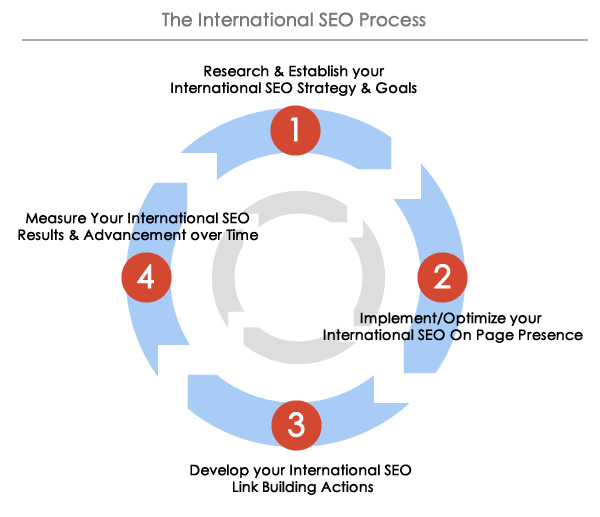Past Borders: The Next Frontier of SEO-- International Optimization
Past Borders: The Next Frontier of SEO-- International Optimization
Blog Article
Browsing the Digital Landscape: Leveraging International Search Engine Optimization for Cross-Border Success
In today's interconnected electronic globe, businesses are increasingly looking past borders to use worldwide markets. Leveraging seo (SEO) approaches customized for worldwide audiences is important for attaining cross-border success. The intricacy of browsing the digital landscape on a worldwide scale requires a nuanced technique, from recognizing the fundamentals of International SEO to carrying out geotargeting and multilingual keyword phrase techniques. As business strive to increase their reach and presence throughout different regions, maximizing website frameworks and keeping an eye on cross-border performance ended up being vital elements of a successful global SEO technique.
Recognizing International SEO Basics
Navigating the complexities of international Search engine optimization requires a strong understanding of fundamental principles to properly increase on the internet presence across borders. One critical facet of international SEO is comprehending the importance of localization.
In addition, having a clear understanding of geo-targeting is essential. This entails suggesting to internet search engine the details nations or regions a web site is targeting. Carrying out hreflang tags is one method to communicate this info, ensuring that the proper version of a webpage appears in the search engine result for an individual in a certain area.
Furthermore, comprehending the effect of regional search engines and social media platforms is vital for global SEO success. While Google is dominant in several areas, countries like China have their own search engines like Baidu, requiring tailored methods for each platform to make the most of on the internet presence (International SEO).

Targeting Multilingual Search Phrase Approaches
Establishing multilingual keyword phrase methods is crucial for successfully getting to varied global audiences and making the most of on-line exposure across various etymological areas. When targeting multilingual key words techniques, it is vital to perform complete research to recognize the specific search terms and expressions used by the target market in each etymological region. This entails not only converting key words but additionally taking into consideration cultural subtleties, local dialects, and search trends unique to each target audience.
To develop a successful multilingual key phrase technique, it is necessary to prioritize relevance and search intent. Key words ought to line up with the material on the site and reverberate with the cultural context of the target market. Using tools such as Google Key Words Coordinator, SEMrush, or Ahrefs can help identify high-performing keywords in various languages and assess their search volume and competition degree.
Additionally, tracking and assessing the efficiency of multilingual key words frequently is vital for maximizing and fine-tuning the technique gradually. By constantly adjusting to modifications in search habits and trends, services can improve their online exposure and attract more worldwide website traffic to their internet sites.
Executing Geotargeting and Hreflang Tags
When aiming to enhance global search engine optimization strategies, incorporating geotargeting and hreflang tags is important for enhancing internet site exposure throughout different areas. Geotargeting involves customizing content to details areas, guaranteeing that customers in various areas obtain appropriate info. By executing geotargeting, organizations can enhance their local search positions and draw in region-specific web traffic.

Optimizing Web Site Framework for Worldwide Presence
To additionally improve worldwide search engine optimization strategies past geotargeting and hreflang tags, optimizing the web site structure is crucial for attaining international visibility and taking full advantage of reach across various areas. A well-structured web site not only see here enhances customer experience however also helps with internet search engine crawlers in understanding the material and context of the website. When going for global exposure, it is important to make certain that the internet site is arranged in a logical fashion that satisfies his comment is here users from different countries. Carrying out a clear pecking order with distinctive categories and subcategories can aid in improving the website's navigation and user-friendliness.
Additionally, developing language-specific subdirectories or subdomains can help internet search engine provide the ideal version of the website to customers based on their language preferences, even more enhancing the general customer experience. In addition, optimizing URL structures to consist of relevant keywords and geotargeted terms can improve the website's exposure in various areas. By structuring the website successfully for worldwide target markets, businesses can raise their chances of attracting worldwide website traffic and increasing their reach throughout boundaries.

Monitoring and Analyzing Cross-Border Efficiency
Reliable surveillance and studying of cross-border efficiency is important for evaluating the success of worldwide search engine optimization methods and identifying opportunities for improvement in global reach and presence. By very closely tracking key efficiency indicators (KPIs) across different markets, businesses can gain useful understandings into the effectiveness of their cross-border SEO efforts. Monitoring metrics such as natural traffic, keyword positions, conversion prices, and you could try this out bounce prices can provide a comprehensive view of how well a website is executing in numerous regions.
Analyzing cross-border efficiency data allows organizations to determine patterns, patterns, and locations for optimization. By contrasting performance across different nations, areas, or languages, companies can identify effective approaches and center content to better provide to details target audiences. Additionally, monitoring cross-border efficiency makes it possible for services to stay nimble and responsive in the ever-evolving digital landscape. Regular evaluation of SEO performance on an international scale guarantees that business can adapt their techniques rapidly to maximize emerging chances and maintain an affordable edge in international markets.
Conclusion
In conclusion, international SEO plays an essential function in attaining cross-border success by optimizing websites for global exposure, targeting multilingual search phrase approaches, executing geotargeting and hreflang tags, and monitoring cross-border performance. By understanding the basics of worldwide SEO and enhancing site structures as necessary, companies can successfully get to and engage with their target market throughout different regions and languages. This calculated strategy is essential for increasing market reach and driving on-line development in today's electronic landscape.
Report this page